![]() Add To Cart This Word Template
Add To Cart This Word Template
 Add To Cart Proposal Pack Ranching #1
Add To Cart Proposal Pack Ranching #1
 Add To Cart Proposal Kit Professional Bundle
Add To Cart Proposal Kit Professional Bundle


Key Takeaways
- One-time License, No Subscriptions: Pay once and use Proposal Kit forever with an up-front price lower than monthly services over time.
- Best Template Flexibility: Start with a proven Ranching Supply Sample Proposal and customize every section, logo, and color to fit your brand and project scope.
- Instant Access: Download immediately and open the sample proposal right away with no waiting, no onboarding delay.
- Ready-Made Structure: See a complete, real-world example (executive summary, scope, schedule, budget, and more) you can mirror for your project. Get a Proposal Pack or Professional package and use the AI Writer to create custom tailored samples or complete first drafts.
- Fully Editable Documents: Replace text, sections, and branding in minutes - no special software skills required.
- Step-by-Step Help: The Proposal Pack Wizard training mode, documentation, and videos guide you through customizing every section so you do not get stuck.
- Built-In Pricing and Quotes: Automate line-item quotes, totals, and taxes from a database, and insert tables/charts so your pricing is clear and consistent.
- Clear Pricing and Bundles: Choose a single industry pack or the Professional bundle for straightforward options that keep costs predictable as your needs grow.
How to write your Ranching Supply Proposal
You can create your customized editable variation of this document using Proposal Kit. Follow these steps to get started.
 DOWNLOADABLE, ONE-TIME COST, NO SUBSCRIPTION FEES
DOWNLOADABLE, ONE-TIME COST, NO SUBSCRIPTION FEES
Proposal Pack includes everything you need to get started now
- This sample proposal plus
- Library of all 200 samples
- Library of editable templates
- All templates in this design
- Basic contracts and invoices
- Financial calculators
- Wizard proposal software
- How to Write a Proposal e-books
- Customize with your logo
Screenshots of 4 of 9 pages of this sample
Click the PDF View link above to see more. The complete sample is included in every Proposal Pack and the included Wizard software can build you an editable version in Word that will be in the design theme you purchased. You can purchase a different design theme than the sample is illustrated with.
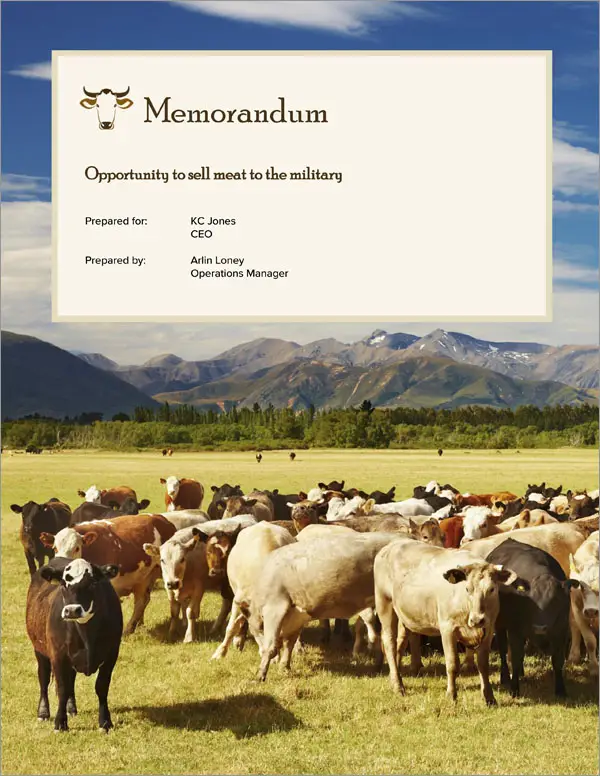
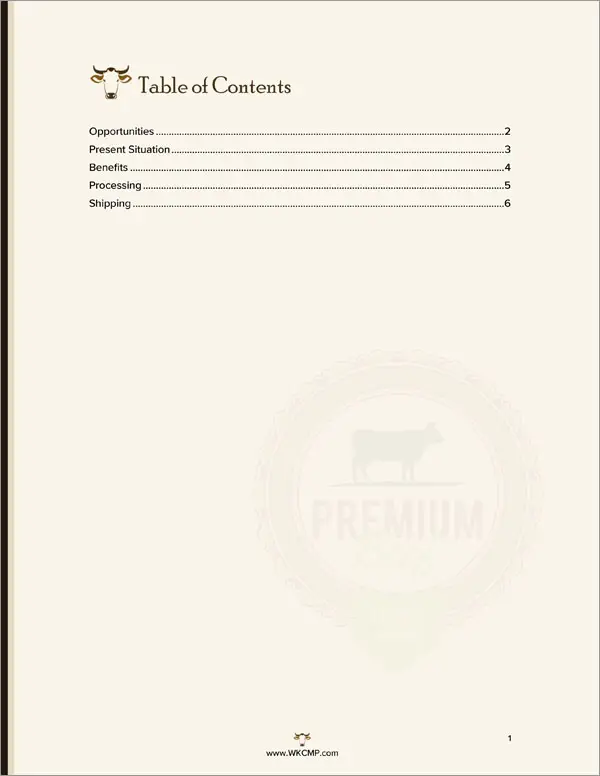
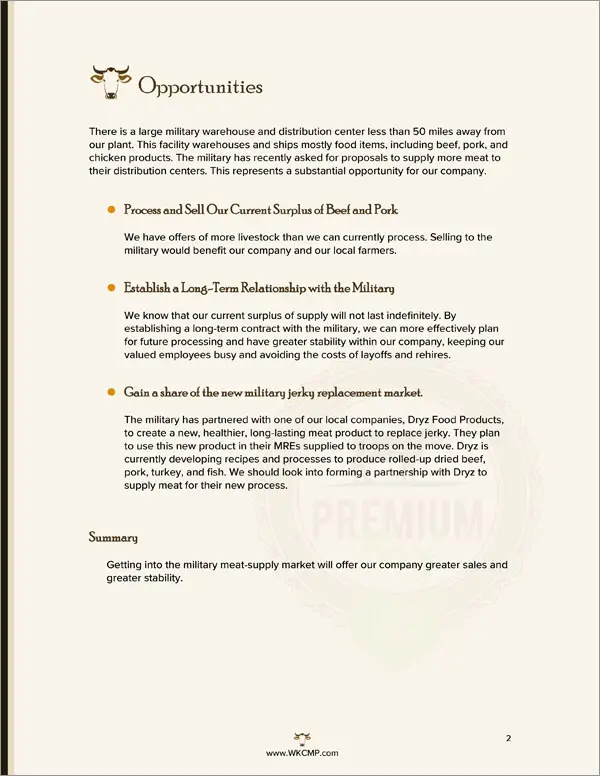
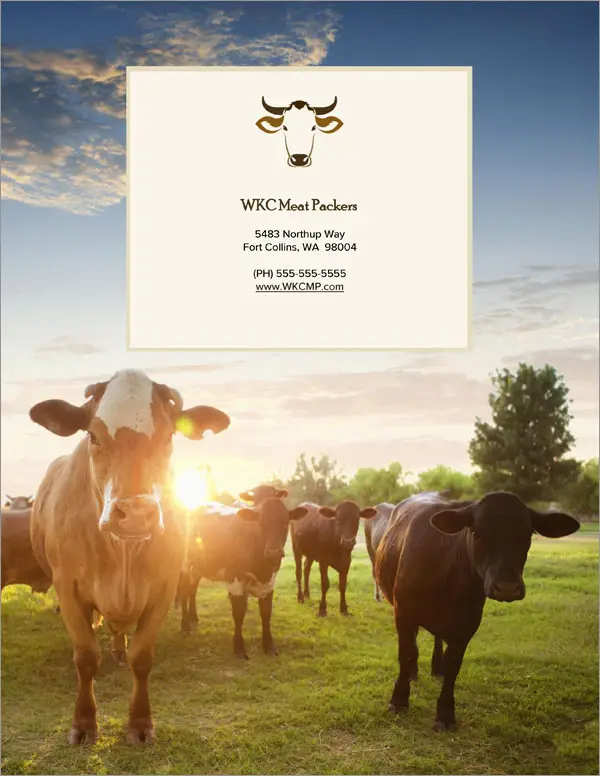
1. Get a Proposal Pack such as Ranching #1
This sample was created using the design theme Proposal Pack Ranching #1. You can recreate this same sample using any of our Proposal Pack design themes and have it customized for your business.
We include this sample in PDF and editable Word format chapters that can be customized using the included Wizard software when purchased with a Proposal Pack or the Professional Bundle.
To create your customized proposal using your logo and colors, get Proposal Pack for Any Business. We include this sample in every Proposal Pack.
2. Download and install after ordering
Once you have ordered and downloaded your Proposal Pack you will have all the content you need to get started. If you order the sample as a template you will download the Word document after ordering and edit it in your office software.
3. Set up the included Wizard software
While the Wizard software makes the process more efficient, you can manually assemble your version of this sample using the content provided and just a Word processor. We only include the Wizard software with a Proposal Pack or the Professional Bundle.
4. Import the Quick Start layout titled 'Ranching Supply Sample Proposal'
The included Proposal Pack Wizard software makes creating a customized version of this document speedy and efficient. The sample content is in Word format documents, so you can also use the sample text without using our Wizard software. Using the Wizard software, you can create custom variations of this template and automate your quotes with the line item database.
This is a good example to follow for anyone proposing ranching or supply related projects.
Anyone pitching product sales in the ranching industry or writing internal company proposals.
5. Customize the template with your information
You can customize the layout with different chapters, change the order of chapters, import your content and information, change the visual design, edit the text, and more. You have complete control over customizing this sample. Use the Wizard's AI Writer to create personalized content specific to your business and project that can be merged with the sample.
Once finished, the AI Writer's Word-to-PowerPoint converter can transform your proposal, business plan, or other business documents into a PowerPoint slideshow.
Abstract
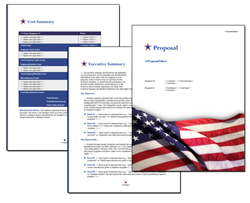
This project proposal addresses the growing opportunities and challenges within the farm supply industry and cattle business, specifically targeting the supply of high-quality products to large-scale institutional buyers such as the military. The document provides a comprehensive company overview, highlighting the management team s expertise and proven track record in delivering superior products and professional services to the local market. Through detailed market research and analysis of market size, trends, and target customers, the business plan outlines strategies to expand the customer base, enhance customer satisfaction, and build brand awareness among potential customers, local residents, distributors, retailers, and restaurants.
With a focus on sustainable practices, ethical operations, and community engagement, the proposal demonstrates a commitment to animal health, soil health, and biosecurity measures aimed at preventing disease outbreaks and ensuring compliance with agricultural regulations. The operations plan details day-to-day operations, breeding programs, and efficient use of capital, equipment, technology, and water sources, all contributing to the company s competitive advantages and reputation for quality products. By using competitive pricing and smart pricing strategies, the company aims to deliver value while managing marketing costs and maximizing net cash flow and profitability.
The financial plan presents financial projections and budgets necessary for securing funding and investments, including funding required for expansion and payroll. This executive summary explains how the company will achieve the following milestones: increasing production efficiency, meeting the specific needs of target markets, and maintaining high levels of customer loyalty. By using its prime location, strong brand presence, and ability to customize product and service offerings, the business is well-positioned to address competition and differentiate itself in the region.
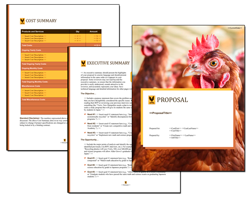
The project proposal outlines the implementation of a marketing strategy and a marketing plan, including direct sales and targeted marketing efforts to increase revenue and income. Through effective management and operations, the company will serve the agricultural community and play an important role in supporting local ranchers, promoting the nutritional value of products derived from cattle, and contributing to the broader agricultural economy. The following table of contents and document structure provide clear access to all resources and services offered, enabling stakeholders, investors, and the management team to track progress, understand risk, and align with the vision for sustainable growth and long-term success in the cattle industry.
The cattle farm and ranching supply sectors must adapt to the increasing popularity of sustainable practices and heightened expectations for ethical practices and quality products. This proposal addresses these critical topics by outlining how a modern corporation can establish and maintain a competitive edge through the effective use of data, advanced management tools, and innovative software solutions like Proposal Kit. The software s intuitive interface and customizable templates streamline the development, introduction, and continuous adjustment of proposals, ensuring that every document showcases a strong visual design, effective structure, and clear objectives tailored to both the local and broader markets.
The ongoing rise in demand for organic and responsibly raised cattle across the country - and around the world - has made it more important than ever for companies to promote their background, track record, and commitment to sustainability. By highlighting the history of the business, the origins of its land and property, and the characteristics that differentiate it from competitors, the proposal helps attract new equity, investments, and potential customers who value transparency and ethical sourcing. This approach not only aids in the creation of high-quality, antibiotic-free meat products but also supports local economies by reducing unemployment and increasing productivity at every stage, from breeding programs and animal care to processing and distribution.
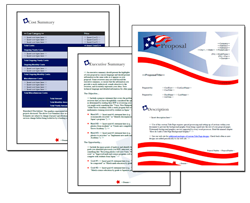
Proposal Kit s broad range of templates and tools enables any team, regardless of their past experience, to prepare detailed project proposals that take into account the unique needs of both the cattle industry and the agriculture sector at large. The included software helps users to adjust pricing, estimate budgets, and present financial data in a way that is attractive to stakeholders, while also linking to company websites and other resources for deeper understanding. This is particularly important for businesses located in prime agricultural regions, where competition is fierce and the ability to quickly acquire, analyze, and act on information can make all the difference in achieving long-term viability.
As companies begin or expand their operations, it is vital to foster strong customer relationships by providing a broad range of services tailored to the specific needs of target customers. This includes the implementation of educational initiatives, community engagement, and collaboration with industry partners to promote knowledge, understanding, and the importance of sustainable land management. By using Proposal Kit s features, ranching supply businesses can better communicate their vision, explain the scope of services offered, and demonstrate how their operations contribute to the advancement of agriculture, sustainability, and economic growth. In doing so, they position themselves as leaders in a field whose significance continues to grow in a world increasingly focused on responsible food production and ethical business practices.
By preparing comprehensive, visually compelling proposals that clearly articulate objectives, pricing strategies, and value propositions, businesses can establish an attractive presence in the market, promote the effectiveness of their operations, and showcase their ability to serve a variety of stakeholders. This holistic approach not only builds trust but also enhances the company s reputation and capacity for ongoing growth in the dynamic and competitive landscape of the cattle and ranching industry.
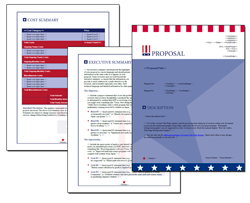
This proposal emphasizes the importance of every stage in the establishment and growth of a cattle farm or ranching supply business, from the initial idea to the ongoing development of operations. Companies founded on principles of sustainability and quality are expected to provide quality products that meet strict industry requirements and consumer preferences, including the increasing demand for meat without antibiotics. The involvement of local stakeholders, from ranchers to distributors, is critical in ensuring that the standards of excellence are maintained throughout all processes.
When preparing a proposal, it is important to introduce data-driven estimates on production capacity, market demand, and pricing to support a competitive yet fair price for both suppliers and buyers. Accurate estimates provide transparency and foster trust among all parties involved, contributing to stronger business relationships and more predictable revenue streams. The proposal also encourages prospective clients or partners to visit the facility, observe the processes firsthand, and gain a deeper understanding of the company s commitment to best practices and ethical operations.
By including links to the company s website and other relevant resources, the proposal allows readers to explore the background and history of the business, as well as the various products and services offered. This approach helps communicate the unique value proposition and introduces new audiences to the company s mission and vision. The ability to clearly outline each stage of operations, from cattle selection to processing and delivery, enables the company to demonstrate reliability and expertise.
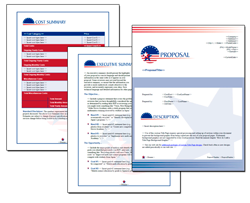
In today s market, being clear about pricing strategies and how they are determined is increasingly important for building lasting trust. Companies that openly discuss their process, explain the rationale behind their prices, and consistently deliver high standards are better positioned to retain loyal customers and attract new business. Ultimately, this comprehensive approach to proposal development, supported by advanced tools and a focus on quality at every stage, helps ranching supply businesses not only meet but exceed expected outcomes in a competitive industry.
Ranching Supply Sample Proposal - The Narrative
Opportunity to Sell Meat to the Military
It has come to my attention that we may have an opportunity to sell meat to the local military warehouse. This could mean a substantial increase in our production and sales, and also offer a more stable and predictable future. I’ve discussed this opportunity in the following pages. I’d like to pursue the matter further as soon as I have your approval to do so.
WKC Meat Packers should be getting into the military meat-supply market to offer our company greater sales and greater stability. There is a large military warehouse and distribution center less than 50 miles away from our plant. This facility warehouses and ships mostly food items, including beef, pork, and chicken products.
The military has recently asked for proposals to supply more meat to their distribution centers. This represents a substantial opportunity for our company. Process and Sell Our Current Surplus of Beef and Pork We have offers of more livestock than we can currently process. Selling to the military would benefit our company and our local farmers.
Establish a Long-Term Relationship with the Military We know that our current surplus of supply will not last indefinitely. By establishing a long-term contract with the military, we can more effectively plan for future processing and have greater stability within our company, keeping our valued employees busy and avoiding the costs of layoffs and rehires. Gain a share of the new military jerky replacement market. The military has partnered with one of our local companies, Dryz Food Products, to create a new, healthier, long-lasting meat product to replace jerky.
They plan to use this new product in their MREs supplied to troops on the move. Dryz is currently developing recipes and processes to produce rolled-up dried beef, pork, turkey, and fish. We should look into forming a partnership with Dryz to supply meat for their new process. Getting into the military meat-supply market will offer our company greater sales and greater stability.
As you know, local ranchers are currently selling more livestock than usual due to several years of drought and low feed situations. Because of this, there is a surplus of beef in particular in our area, and we are actually turning away beef and pork suppliers because we don’t have sufficient orders from stores. In summary, at the current time, supply is greater than demand among the American public.
We can process and ship excess supplies to commercial freezers, but we also have a large market in the nearby military warehouse that we have not yet tapped for both fresh and frozen meats. Selling beef and pork to the military would benefit not only our company and our employees, but also local farmers and the military. WKC Meat Packers will realize the following benefits provided by selling meat to the military.
Increase production
We currently operate at only about 75% of capacity because we don’t have sufficient orders to fill. Selling to the military could increase our production to full capacity.
Increase jobs
Jobs are in short supply in our area. If we operated at full capacity, we would need to hire 25% more workers. Create a stable and dependable number of monthly orders.
Our current grocery store clients tend to order seasonally and sporadically. The military needs a steady of supply of all sorts of meats. Doing business with them could smooth out the ups and downs of our current production cycle.
Increase sales for local ranchers. Our ranchers are currently offering us more beef and pork than we have customers for. The military would absorb this current surplus and create a bigger market for the future.
Provide our servicemen and women with quality meat products. Our military deserves only the finest and we can supply fresh, quality beef and pork. There seems to be no downside to doing business with the military.
The meat cuts wanted by the military fall into the following categories. Steaks, ribs, roasts, and ground beef and pork. The military also has very strict guidelines on packaging in specific numbers and weights with appropriate labels and documentation.
We would need to adapt our current process to meet the military specifications as follows. Separate different cuts into group packages - for example, 25 steaks in one package - instead of packaging each cut separately as we now do. Wrap group packages in heavy duty plastic wrap. Label packages as dictated on the military supply site.
Note that they use bar codes on labels that we would have to incorporate into our label printing system. Maintain records of origin, processing dates, storage dates, temperature, etc. Store fresh packages in the meat locker at 39 degrees until pickup by transport; and frozen packages at 30 degrees.
If not frozen, storage must be less than 36 hours. If frozen, storage can be up to 60 hours. Ship all records of origin, processing, and transport along with packaged meat to the military warehouse.
Our normal shipper, Ice Cold Transport Inc., does not typically include the military warehouse on its standard delivery route. However, we could pay ICTI to add the military warehouse to their route, or look into using one of the following two trucking companies. Tuxon Transport This company trucks produce for the military warehouse from wholesalers in our area, passing very close to our plant. Their fleet includes refrigerated trucks that could be used to transport meat.
Jon Frost Trucking This is a brand-new company in our area. Jon owns three trucks, two of which are refrigerated. If we contract with him, we would be supporting our neighbor in his new business venture.
We do not currently have a plan for shipping meat to the military warehouse and distribution center. However, we have several options and could no doubt come to a satisfactory arrangement with one of the three companies mentioned above.
 What Our Clients Say
What Our Clients SayProposal Kit’s templates and formats helped us rework our own proposals to make them both look more professional, and make them easier to write. Definitely a must use product to streamline the proposal process."
CorpSolv Inc.
There are 200 complete sample proposals including this one in each Proposal Pack
The following related samples are also included in Proposal Pack:
These template layouts are related to this sample
The following related templates are also included in Proposal Pack with this sample:
Length of Sample
9 PagesThere are thousands of chapters to choose from in Proposal Pack. This sample uses the following set of Proposal Pack chapter templates: Cover Letter, Title Page, Table of Contents, Opportunities, Present Situation, Benefits, Processing, Shipping, Back Page.
This sample illustrates how to write the following types of proposals
- General business proposal
- Non-technical proposal
- Product sales proposal
- Internal company proposal
- Food, beverage, catering, grocery proposal
- Military proposal
- Ranching proposal
- Many other types of proposals
Samples can be created in any Proposal Pack design theme
This sample was created with Proposal Pack Ranching #1. To change the visual look purchase any Proposal Pack and this sample will be created in that design theme.
Out of the over 501 Proposal Packs available these designs are also popular for this type of proposal and this sample proposal is also included in every Proposal Pack:
Photo Design Proposal Packs
 Proposal Pack Flag #6
Proposal Pack Flag #6 Proposal Pack Ranching #2
Proposal Pack Ranching #2Line Art Design Proposal Packs
 Proposal Pack Flag #1
Proposal Pack Flag #1 Proposal Pack Flag #2
Proposal Pack Flag #2 Proposal Pack Flag #3
Proposal Pack Flag #3 Proposal Pack Flag #4
Proposal Pack Flag #4 Proposal Pack Flag #5
Proposal Pack Flag #520% Off Discount
![]() Add To Cart This Word Template
Add To Cart This Word Template
 Add To Cart Proposal Pack Ranching #1
Add To Cart Proposal Pack Ranching #1
 Add To Cart Proposal Kit Professional Bundle
Add To Cart Proposal Kit Professional Bundle
 4.7 stars, based on 849 reviews
4.7 stars, based on 849 reviewsFrequently Asked Questions
How do I customize this sample to fit my specific project or business?
If you purchase this sample as a static template, it will be an editable Word format document; otherwise, if you buy a Proposal Pack or the Professional bundle, you can build a more customized editable Word document version of it using the included Wizard software. You can replace the sample information with your own, adjust the text to match your company's tone and style, and modify sections to include project-specific details. The included AI Writer will also customize the content for you.
Can I use multiple sample proposals for different types of projects?
You can purchase multiple samples as individual Word templates or all 200 samples are included in every Proposal Pack and Proposal Kit Professional, which is a much better deal. The Proposal Kit offers sample proposals for various industries and project types. You can select and customize different sample proposals to suit each unique project. This flexibility allows you to create tailored proposals for other clients or projects.
How can I integrate my branding into this sample?
While this sample is an editable Word document, depending on the level of custom branding needed, consider the Proposal Kit Professional, which includes the branding features in the Wizard software that let you create custom-branded design themes more effectively. Start by incorporating your company's logo on the cover page, as well as in the headers and footers of the document. Next, adjust the color scheme of the proposal to match your brand colors. Change the fonts in the proposal to align with your brand's standard fonts. Including branded graphics that reflect your brand's style will further enhance the proposal. Additionally, ensure that the text within the proposal maintains a tone and voice consistent with your brand's communication style. By integrating these elements, your proposal will reinforce your brand identity.
How do I ensure my proposal stands out and wins the client?
To ensure your proposal stands out:
- Personalize the content: Address the client's needs, challenges, and goals to make the proposal unique.
- Highlight your value proposition: Communicate what sets your business apart and how to deliver superior results.
- Use professional design elements: Incorporate visuals, charts, and graphs to enhance the presentation and make it more engaging.
- Proofread and edit: Ensure the proposal is error-free and well-organized. A polished, professional document reflects your attention to detail and professionalism.
What should I do if I need help understanding or modifying a section of this sample?
If you need help understanding or modifying a section of this sample, refer to the detailed instructions provided. Additionally, Proposal Kit includes customer support and resources such as tutorials and videos to assist you. Consulting with a colleague or a professional in your industry can also be beneficial if further clarification is needed. Asking an AI tool can also provide valuable insights for immediate needs. You can load this sample into the Wizard software and let its AI Writer customize the pages for you.
 Ian Lauder has been helping businesses write their proposals and contracts for two decades. Ian is the owner and founder of Proposal Kit, one of the original sources of business proposal and contract software products started in 1997.
Ian Lauder has been helping businesses write their proposals and contracts for two decades. Ian is the owner and founder of Proposal Kit, one of the original sources of business proposal and contract software products started in 1997.By Ian Lauder
 Published by Proposal Kit, Inc.
Published by Proposal Kit, Inc.


 Cart
Cart
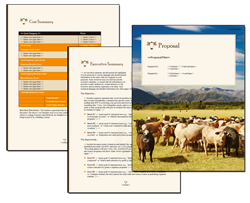

 Facebook
Facebook YouTube
YouTube Bluesky
Bluesky Search Site
Search Site